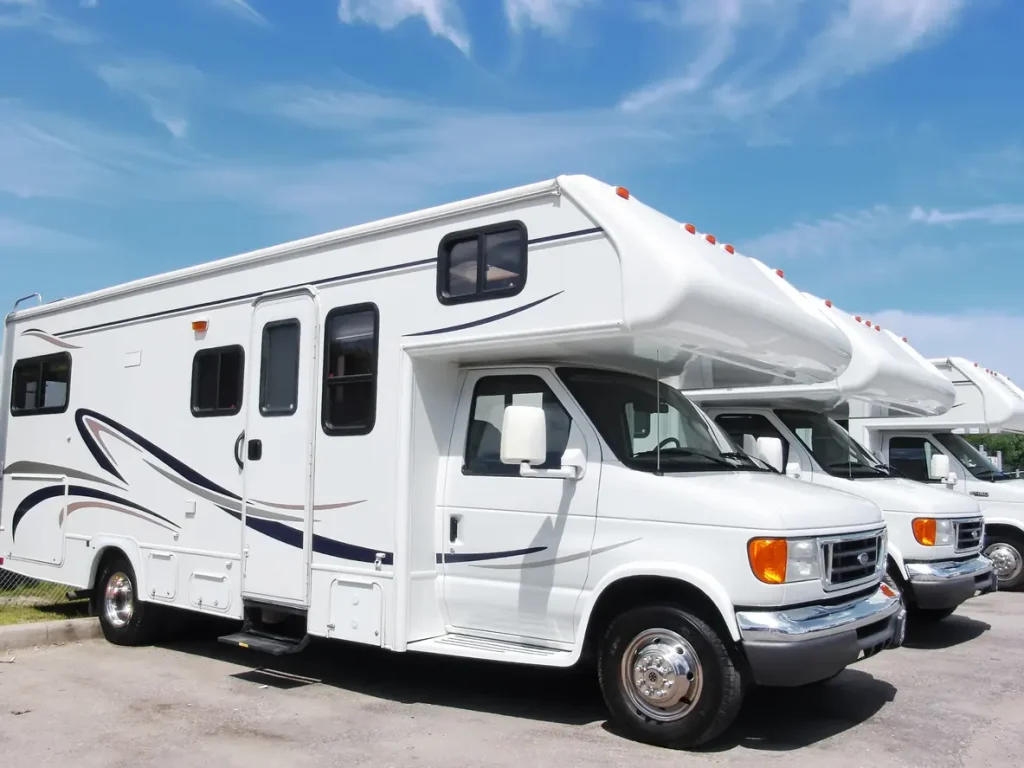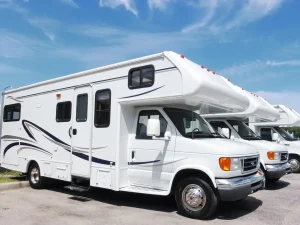Camping is a perennial family favorite for budget-friendly vacations. Even during a recession, people make trips to RV parks, campgrounds, and wilderness areas a priority. It’s healing to spend time outdoors and with family and friends.
So what if you’ve decided to buy your own RV this year? Should you be looking for a new motorhome or travel trailer or should you check out the used market? Let’s take a look at some pros and cons of both new and used RV shopping.
Make some basic decisions before you begin shopping for an RV of any kind. This will help you wade through the options without getting overwhelmed. Here are a few things to decide before you begin your search:
- Size. How big is the RV of your dreams? Maybe it’s a two-person teardrop trailer, maybe it’s a full-size converted bus. Figuring out whether you’re looking for a small, medium, or large RV will help you narrow the choices.
- Type. Which better fits your needs, a motorhome or a travel trailer? Some people love the freedom of having a second vehicle after they park their RV. Others don’t have a large enough vehicle or don’t like towing.
- Amenities. What are the things you absolutely cannot do without in your RV? For some of you, it will be a bathroom and shower, for others a full kitchen. Take the time to really think about what you need to be happy traveling in your RV.
- Style. What’s your vacation style? If you’re going to boondock for several weeks you’ll want something different than a family who spends weekends at a campground near the beach. If your favorite RV parks have ten-year rules, that will also affect what you buy.
- Budget. Make sure you aren’t looking at anything you can’t afford. Set a price range and stick with it. Don’t make the mistake of renting or test driving a vehicle far above your price range. That’s just a recipe for bad feelings or overspending. You can find a great RV without busting your budget.
Shopping for a New RV
As you visit RV dealers to check out new models, you’ll find that while the options are endless, the supply is not. It has been hard in the past couple of years to get some models. Demand has outpaced manufacturers’ production capacity.
But there are certainly new RVs out there. The price is higher now than it was before the pandemic, so be prepared. But also be prepared to find some great features and amenities.
Pros
- Tech. The latest technologies are used in new RVs. The newest sealants, appliances, and slide out components are usually a step up from the generation before. This is particularly attractive if you want to put off upgrades as long as possible.
- Squeaky Clean. A brand new rig is clean and ready to go. You can kick back on the sofa knowing that yours is the first head to hit the pillow.
- Warranties. New RVs usually have a handful of warranties. From manufacturers’ warranties to appliances, carpets, and even electronics, you have some financial coverage if things go awry. Be sure to check them thoroughly, though. You need to know exactly what is and isn’t covered before you count on warranties for protection.
- Maintenance and Repairs. Your new RV will need regular maintenance. But it’s not likely to require major repairs right away. And if it does, they might be covered under a warranty.
Cons
- Price. New RVs are very expensive. Depending on the size and style you’re looking for, a new coach may be out of your budget.
- Untested. Nobody has worked out all the bugs. Not literal bugs, of course. We’re talking about the little things you find that aren’t quite right as you travel for the first time. RVs are more like homes than cars. There will always be something on a brand new motorhome or trailer that needs tweaking.
- Quality. Some folks believe that the quality of current new RVs is not up to snuff. While plenty of RVers disagree, take a spin around the internet before you buy. If you’re seeing a lot of complaints about the brand you’re considering, you may want to go back to the drawing board.
- Depreciation. Like a car, an RV goes down in value the minute you drive it off the dealer’s lot. Historically, you could expect your RV to lose 20% of its value in its first drive, and about 5% per year after that.
The market has been wildly unpredictable since the beginning of the pandemic. Some people have been able to sell a well-maintained newer used RV for close to the MSRP.
But if we’ve learned nothing else, it’s that things change. So assume your rig will depreciate at the historical rate when you buy new.
Shopping for a Used RV
We’ll be honest, we love used RVs. It’s a lot of fun to fix them up and make them perfect for your vacation style. That doesn’t mean they’re right for everyone. Here are some pros and cons.
Pros
- Price. Thanks to that depreciation we talked about, you can usually get a lot more for your money when you buy a used RV. Prices are high right now, but they’re still lower than buying new.
- Tried and Tested. Someone else has had the pleasure of working out those new vehicle kinks.
- Customization. When you buy a used RV, you’ll often want to make some changes. You have the opportunity to make the vehicle suit your needs exactly with upgrades and renovations.
- Character. A vintage RV has a lot of charm. You won’t look like everyone else at the campground. Don’t assume every vintage RV is a broken-down shell. Many have been lovingly cared for and remodeled.
- Upgrades. When you’re shopping for a used RV, look for one with upgrades done by the previous owner. Solar panels, new TVs, and kitchen upgrades are pretty common.
- The Hunt. There are large internet sites with thousands of RVs from all over the country. You can look at rigs available from both dealers and private sellers. Take your time and enjoy the process. New listings will come up all the time.
Cons
- Maintenance and Repairs. An older motorhome or trailer is more likely to need repairs before you can take your first RV trip. You sometimes won’t know how well the rig has been maintained but you can avoid nasty surprises.Rule number one for buying a used RV is to get it thoroughly inspected by a qualified professional technician before you buy.It doesn’t matter how charming or inexpensive a used RV is if it’s going to cause you nothing but headaches down the road. Always know what you’re getting into. When you have your inspection, ask about the availability of replacement parts. Some brands take pride in supporting older vehicles. Sometimes there are simply so many out there that parts are readily available. Always ask. You don’t want to be stuck with repairs that can’t be completed.
- Travel. That’s a weird one, right? But you may end up looking at used RVs all over the country to find just the right one. Be patient, and don’t be surprised if a little adventure is involved.
- Warranty. The warranties will either be expired or non-transferrable in nearly all used RV sales. Fortunately, they’re often needed for those early bugs so those should be taken care of by the time you buy.
What’s the Verdict?
There’s no right or wrong choice here, both new and used RVs have their advantages. They are all an investment that needs to be maintained. Find a local shop and set up an RV maintenance schedule as soon as the ink is dry on the sale.
The pandemic changed camping, and a recession may change it further. If you’re buying an RV in 2022, be aware that a lot of people bought RVs in 2020. They aren’t all going to be in love with them two years later. You may be able to find a good-as-new used RV for a great price.
We may also start to see new rigs become more available as manufacturers catch up on their backlogs. Hopefully, that will help moderate prices.
If you have questions about shopping for an RV in these unusual times, contact us at Leisure Coachworks. We’re happy to answer questions about RV maintenance, RV repair, and choosing the motorhome or trailer that’s right for you.


